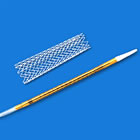January
26, 2011 -- Gaithersburg, Maryland --
The FDA Circulatory System Devices Panel today voted 7-3
in favor
of expanding the indications for carotid artery stenting, specifically
for the
Abbott Vascular RX Acculink Carotid Stent System.
If the FDA follows its panel's recommendation,
which it usually does, the approved indications for carotid
stenting could now include those patients who are at "standard
surgical risk" for the open surgical procedure, called
carotid endarterectomy. Currently,
carotid artery stenting is approved only for those patients
who
are higher
risk for surgery. |


